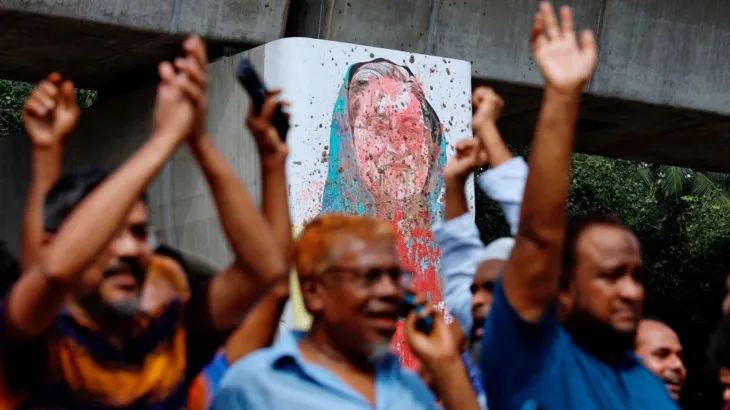What next for Bangladesh, what next for India-Bangladesh relations, now that the leader India considered to be a “friend”, has been thrown out in a “military” coup, carried out under the approving eyes of the great democracies of the West, specifically the United States?
Nobel Laureate Dr Mohammed Yunus, a man favoured by Democrat big-shots such as Bill and Hillary Clinton—Yunus was a donor to the Clinton Foundation—apart from Barack Obama, has been issuing anodyne statements about the need to have calm restored in a country that has been overrun by Islamic jihadis who are going round attacking the minorities, specifically the Hindus. It seems his priority has been to get dropped the graft cases lodged against him by Sheikh Hasina. The law enforcement agencies are nowhere to be seen. There is a complete breakdown of law and order, which essentially means the unrest continues, even though Dhaka is getting back to normal, with students filling in for the job that is supposed to be done by the authorities. This signifies a complete abdication of duty on the part of the authorities. It’s just that after the initial shock of being attacked, the Hindu community has organised themselves and have started pouring out on the streets seeking safety, security and justice for themselves. Some Awami League members, who, along with the Hindus, bore the brunt of the attack, too have started emerging from where they had gone in hiding.
The talk in Dhaka is now about reforming institutions and carrying forward the work of building democracy. Even though the reality is that the government in Dhaka has been foisted on the people and is headed by a man who has been put there undemocratically. Just because Mohammed Yunus has the backing of the US, Bangladesh does not become a democracy. As for the popular uprising that ousted Hasina from power, with generous help from the military, it is actually the mobilisation of a radical mob. A mob rule cannot be the substitute of the people’s will, and in spite of all the talk about democracy, there is no certainty that an election will take place inside the stipulated 90 days or three months, as per the 13th Constitutional amendment. But then democracy in Bangladesh is of a special variety where caretaker governments have functioned in the past even without adhering to the Constitution. Given that the current protagonists are speaking of the “right time” to hold the elections, after institutions are reformed and strengthened, it is anybody’s guess when the “right time” will be. But then it is known that the next election will be tailored to reflect “people’s will” and the government will be a BNP-Jamaat one. So no surprises there. It only remains to be seen if the Awami League is allowed to participate in the election. If not, then everyone who is a part of the interim government, starting with Yunus himself, will be guilty of the same dictatorial tendencies that they had been accusing Hasina of. However, in this case, they may even get away with it, because the US is likely to turn a blind eye to their undemocratic man in Dhaka.
Amid this, it’s worthwhile to take note of the anti-India jingoism sweeping through Bangladesh, which is not going to help India-Bangladesh relations in any manner. Using threats of boycotting Indian goods, or threatening ties because Hasina has taken shelter in India, is not constructive, especially when what Bangladesh is today as a textile-driven economy, is largely because of the help from India, which has supplied it with both machinery and raw material. Power is another area where India has extended a major helping hand, from helping set up the 1,320 megawatt Maitree Super Thermal Power Project, to supplying 1,160 megawatt power from Tripura and West Bengal. But then that sector is mired in uncertainty, as Bangladesh has been facing economic downturn because of Covid and then the Russia-Ukraine war, because of which it has been finding it difficult to make payments to India. Lest we forget, Bangladesh economy is essentially a one-trick pony, with nothing much to show beyond its textile and apparel industry.
While India’s trade with Bangladesh is taking a hit in this climate of turmoil and fear, it can absorb the shock. It is Bangladesh’s economy that will likely tank if mobs keep ruling the streets and the hatred towards India gets aggravated, threatening the lives and livelihoods of Indian interests there. In such a situation, BNP’s statement that India needs to behave for mutual cooperation to continue between the two countries, in the context of Hasina taking shelter here, will not help Bangladesh. As it is BNP has always been a malign player when it comes to India. BNP leader Khaleda Zia and her son, Tariq Rahman acted as tools of Pakistan’s ISI to fuel insurgency in India’s Northeast, when Zia was Prime Minister. It is well known that the Jamaat-e-Islami is an ISI front and will try to make use of the porous India-Bangladesh border to infiltrate terrorists into this country. By saying “India Out” may earn some brownie points from the streets for Bangladesh’s new rulers, but if India really goes “out”, Bangladesh economy may be on the verge of collapse. Bangladesh’s rulers need to realise that jingoism, pogrom of minorities and needling the immediate neighbour, which is an economic and military powerhouse, are a sure-fire way to poverty, hunger and unrest. Thus, Bangladesh’s volatile streets may turn against their current crop of rulers sooner than later.







